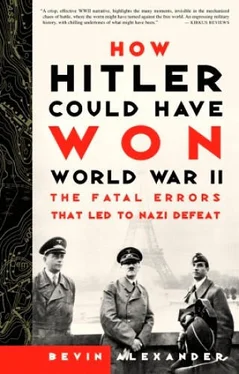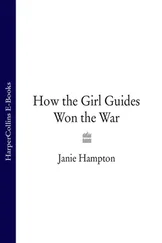The offensive opened on June 5, and France collapsed quickly. Not all the breakthroughs were easy, but the panzers, generally avoiding the villages and towns where defenses had been organized, were soon ranging across the countryside almost at will, creating chaos and causing the French soldiers to surrender by the hundreds of thousands.
An example was Erwin Rommel’s 7th Panzer Division, which crossed the Somme near Hangest east of Abbéville on June 5, and moved so fast and materialized at points so unexpectedly that the French called it the “ghost division.” On June 6, at Les Quesnoy, the entire division lined up on a 2,000-yard front, with the 25th Panzer Regiment in the lead, and advanced across country as if on an exercise. Two days later it reached the Seine River, eleven miles southeast of Rouen, a drive of seventy miles, then turned northwest and raced to the sea at St. Valéry, where it captured the British 51st Highland Division.
Guderian’s panzers cut off northeastern France with a rapid drive to the Swiss frontier. The troops defending the Maginot Line retreated and surrendered almost without firing a shot.
With victory over France assured, Italy entered the war on June 10. The same day President Franklin D. Roosevelt was speaking at commencement at the University of Virginia in Charlottesville. Roosevelt reversed his usual emphasis on avoiding American involvement in the war and promised to extend aid “full speed ahead.” But his address is most remembered for his condemnation of Italy for striking “a dagger into the back of its neighbor.”
The Germans entered Paris on June 14 and reached the Rhône valley on June 16. The same night the French asked for an armistice, and on June 17 Reynaud resigned as premier and was succeeded by Marshal Philippe Pétain. While talks went on, German forces advanced beyond the Loire River. At the same time, a French light cruiser took to safety 1,754 tons of gold from the banks of France, Belgium, and Poland, while, under the direction of British Admiral William James, ships at numerous French ports carried to England nearly 192,000 men and women (144,171 Britons; 18,246 French; 24,352 Poles; 4,938 Czechs; and 162 Belgians). Many of the French joined a new Free French movement under Charles de Gaulle, who had arrived in Britain, vowing to fight on against the Germans.
On June 22 the French accepted the German terms at Compiègne, in the same railway car where the defeated Germans had signed the armistice ending World War I in 1918. On June 25 both sides ceased fire. The greatest military victory in modern times had been achieved in six weeks.
4 HITLER’S FIRST GREAT ERROR

THE SWIFT GERMAN VICTORY OVER FRANCE AND THE EJECTION OF THE BRITISH Expeditionary Force from the Continent without its weapons raised the immediate question of whether Britain could survive.
The obvious answer was what the world expected: German forces would sweep over the narrow seas and conquer the British isles as quickly as they had shattered France. There was only one impediment: Germany had to achieve at least temporary air and sea supremacy over and on the English Channel. Otherwise, ferries, barges, and transports carrying troops could be easily sunk by Royal Navy ships before they could land on English beaches and docks.
The crucial requirement was in the air. German navy leaders believed they could shield landing craft and ships for the short passage, but only if British warships could not run in at will among the convoys. This could be assured only if the Luftwaffe ruled the skies above the invasion fleet, and could bomb and strafe any enemy ship that showed itself.
Hitler was reluctant to invade Britain, thinking the British would come to their senses, recognize their “militarily hopeless situation,” and sue for peace.
He persisted in this view in spite of a speech by Winston Churchill in the House of Commons on June 18, 1940, four days before France gave up. “The whole fury and might of the enemy must very soon be turned on us,” Churchill said. “Hitler knows that he will have to break us in this island or lose the war. If we can stand up to him, all Europe may be free and the life of the world may move forward into broad, sunlit uplands…. Let us therefore brace ourselves to our duties, and so bear ourselves that, if the British Empire and its Commonwealth last for a thousand years, men will say, ‘This was their finest hour.’”
Shortly thereafter, Hitler got a swift lesson in British determination to continue the war.
The Germans had occupied three-fifths of France, including the whole Atlantic coast, leaving the remainder unoccupied with a government under Marshal Pétain centered in the resort town of Vichy. The big question was what would become of the French fleet. Most of it moved into the French Mediterranean harbor of Toulon, but powerful elements remained in North Africa.
Churchill’s government feared a change in the balance of power if even a part of the French fleet got into German hands. The British wanted to take possession of it or eliminate it.
In surprise moves on July 3, 1940, British troops seized French ships that had taken refuge in British harbors, and a powerful British naval group including three battleships and an aircraft carrier under Admiral Sir James Somerville arrived at Oran and Mers-el-Kebir in Algeria, where the largest French flotilla outside Toulon lay at anchor.
Somerville tried to get the French to surrender, but failed, and the British opened fire on their former allies. The battleship Bretagne blew up, the Dunquerque ran aground, the battleship Provence beached, and the torpedo cruiser Magador exploded. The battleship Strasbourg and three heavy destroyers were able to run out to sea, break through the British ring of fire, and reach Toulon, as did seven cruisers berthed at Algiers. Almost 1,300 Frenchmen died in the Mers-el-Kebir battle. Five days later torpedo bombers from the British aircraft carrier Hermes seriously damaged the French battleship Richelieu at Dakar in Senegal.
The British attacks enraged France, but brought before the eyes of people everywhere the striking power of the Royal Navy. It helped to convince President Roosevelt and the American people that backing Britain was a good bet.
Hitler still waited until July 16 before ordering an invasion, named Operation Sea Lion. He said, however, that the undertaking had to be ready by mid-August.
Hermann Göring assured Hitler that his Luftwaffe could drive the Royal Air Force out of the skies in short order. The invasion depended upon Göring’s word.
Britain had only 675 fighter planes (60 percent Hurricanes, 40 percent Spitfires) combat-ready when the battle started. Germany had 800 Messerschmitt 109s to protect its 875 two-engined bombers and 316 Stukas. It also had 250 two-engined Messerschmitt 110 fighters, but these were 60 miles per hour slower than Spitfires, and turned out to be a great disappointment.
The Messerschmitt (or Bf) 109 had a top speed of 350 miles per hour. It was armed with three 20-millimeter cannons and two machine guns. Approximately equal was the British Supermarine Spitfire with a maximum speed of 360 mph and armed with eight machine guns. Somewhat inferior was the British Hawker Hurricane with a top speed of 310 mph, a slower rate of climb, eight machine guns, but more robust and easier to maintain. The 1940 model Hurricane could reach 330 mph and carried four 20-millimeter cannons. The Me-109 and the Spitfire both had a maximum range of about 400 miles, the Hurricane 525 miles.
Aircraft numbers were closely guarded secrets, but leaders everywhere had good estimates of the comparative strengths of the two sides, and few were betting on the British.
Читать дальше



![Джонатан Димблби - Barbarossa - How Hitler Lost the War [calibre]](/books/385421/dzhonatan-dimblbi-barbarossa-how-hitler-lost-the-w-thumb.webp)









